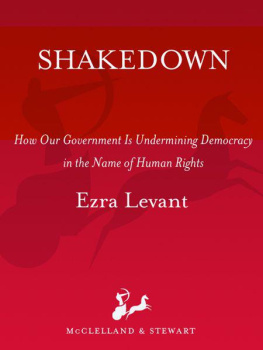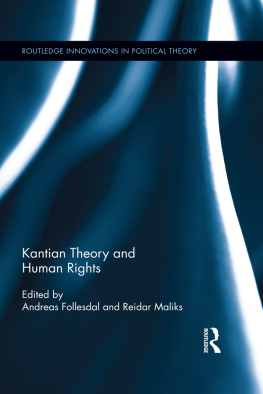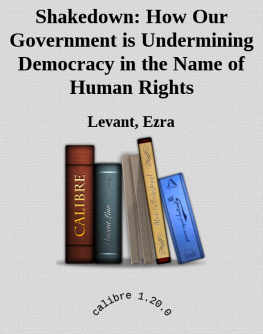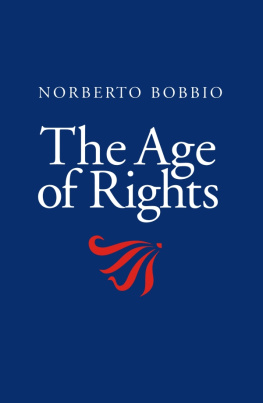FOREWORD
If you want to know what this book's about, the easiest place to start is with one brief soundbite from Ezra Levant's interrogation by the Alberta Human Rights Commission. Ezra had chosen to publish the Danish cartoons the controversial representations of the Prophet Mohammed in his magazine The Western Standard, and as a result had found himself summoned before Shirlene McGovern, a human rights agent for the Government of Alberta. And, at one point in her inquisition, after listening to Ezra's musings on the outrageousness of what was happening, Agent McGovern looked blandly across the table and shrugged:
You're entitled to your opinions, that's for sure.
If only. Clichs are the reflex mechanisms of speech Yeah, sure, it's a free country. Everyone's entitled to his opinion, right? And we get so careless with them that we don't even notice when they become obsolete.
But in Canada you are no longer entitled to your opinion. That clich is no longer operative. You are only entitled to your opinion if Agent McGovern and her colleagues say you are for sure. Canadians do not enjoy the right to free speech. They enjoy instead the right to government-regulated, government-licensed, government-monitored, government-approved speech which is not the same thing at all. Ezra Levant was of the opinion that he should publish the Danish cartoons. That opinion brought down upon him the full force of the Government of Alberta. I wrote an international bestseller called America Alone, a Number One book in Canada, excerpted in the country's oldest and biggest-selling magazine Maclean's. The opinions expressed in my book and that magazine excerpt were put on trial for a week in a Vancouver courthouse.
This is not North Korea or Sudan, Ceausescu's Romania or Saddam's Iraq. If it were, what's going on would be easier to spot. So if, like hundreds of thousands of viewers around the world, you go to YouTube and look at the videos of Ezra Levant's interrogation, you will find not a jackbooted thug prowling a torture chamber but a dull bureaucrat asking soft-spoken questions in a boring office. Nevertheless, she is engaged in a totalitarian act.
You're entitled to your opinions, that's for sure.
No, sorry. If he were, he wouldn't be there. If I'd been entitled to my opinions, I wouldn't have been at the British Columbia Human Rights Tribunal. In the Canada of the 21st century, it's the job of Shirlene McGovern and her fellow government human rights agents from coast to coast to determine whether you are entitled to your opinions.
That is an abomination to a free society. And that's what this book is about.
Let's take it as read that Ezra Levant and I are, as our critics claim, offensive. That's the point. It's offensive speech that requires legal protection. If you don't believe in freedom of speech for offensive speech, you don't believe in freedom of speech at all. Anyone can be in favour of Barney the Dinosaur singing Sharing Is Caring. But any original thinking on almost any issue is likely to be controversial and offensive to someone, whether you're writing about Islam, abortion, American foreign policy, climate change, or anything else. That's what makes free societies the most dynamic on the planet: they're great big jostling marketplaces of ideas. Ezra and I have a higher opinion of Canadians than Agent McGovern and her fellow thought police do. They think you're wee sensitive delicate creatures who need to be protected by the state from anything that might discombobulate you. We think that, as citizens of one of the oldest settled constitutional democracies on the planet, you're perfectly capable of deciding for yourself what you want to read. You don't need your opinions monitored by government enforcers, some of whom are incompetent, others of whom are corrupt, and none of whom should have the powers they have.
Ezra is an unlikely hero but he is a genuine one. To be sure, as his detractors like to say, he's also a blowhard, a loudmouth, a self-promoter, a controversy entrepreneur, etc. I speak as one myself. It takes one to know one. If he weren't a blowhard, loudmouth, whatever, his heroism would have been far less effective. Instead, in the space of 12 months, he did more than anyone to transform the reputation of Canada's human rights commissions. In November 2007, insofar as anyone was even aware of them, the smiley-face Orwellian name conjured mostly sappy self-flattering delusions about this country's commitment to social progress. A year later, at the policy convention of Canada's governing party, over 99 per cent of delegates voted to abolish the Section 13 hate speech provision of the Human Rights Code, and a respected Liberal Member of Parliament filed a motion calling for an inquiry into the conduct of the federal human rights commission. And, in implicit acknowledgement of the worst year of publicity in its history, at the end of November 2008, the Canadian Human Rights Commission's own report into free speech issues also called for the abolition of Section 13. The decline in reputation of Canada's human rights racket in those 12 months was driven principally by the energy and passion Ezra Levant brought to the cause.
The word Ezra used to describe his strategy is denormalization. Before he and I had the misfortune to attract the attention of our tormentors at the Canadian Human Rights Commission, the Alberta Human Rights Commission, the Ontario Human Rights Commission and the British Columbia Human Rights Tribunal, these agencies were merely another unremarkable branch of the Dominion's swollen bureaucracy, headed by Queen's Counsels, officers of the Order of Canada, former mayors of great cities, holders of the Queen's Jubilee Medal, and other paragons of the establishment. Thanks to Ezra's sustained campaign of denormalization, more and more Canadians now understand that these beribboned eminences preside over an ugly thuggish machine that is incompatible with a free society. In June of 2008, I sat in a courthouse in Vancouver and listened to a week's worth of expert witnesses discuss my writing, my jokes, my authorial tone, and other weighty matters that in civilized jurisdictions would be of concern only to obscure literary critics but which in Canada now get you dragged up before a panel of pseudo-judges. The courthouse looked like any other in the nation: The bar, the witness box, the Royal Coat of Arms on the wall to symbolize the ancient legal inheritance to which this trio of judges claimed title. Yet they should really have hung the arms upside down, with the crown pointing to the floor: The British Columbia Human Rights Tribunal inverts every principle of Common Law; it discards real human rights the right to a fair trial, the right to due process, the right to the presumption of innocence and supplants them with a set of ersatz human rights, notably the human right not to be offended, not by no-one, nowhere, no how. That is, if one belongs to certain approved victim groups.
Before they made the strategic miscalculation of going after Ezra's Western Standard and then me and









